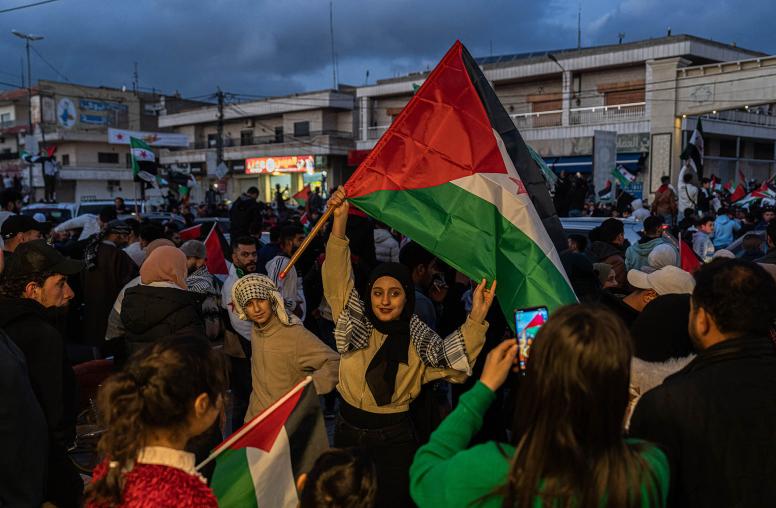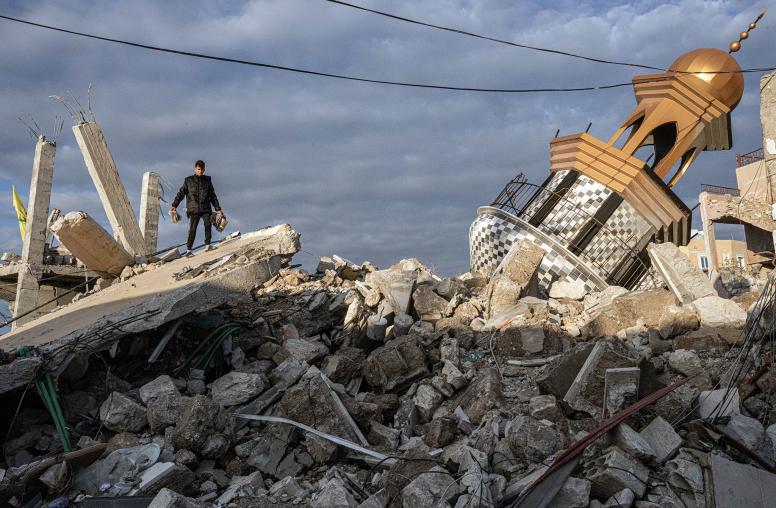Elie Abouaoun on Lebanon’s Deepening Crisis
Lebanon’s leaders have lacked a cohesive strategy to respond to COVID-19, exacerbating tensions that sparked mass protests last fall. But while the government struggles, and Hezbollah’s influence weakens, USIP’s Elie Abouaoun says, “Unfortunately, the protest movement is as fragmented as the government.”
On Peace is a weekly podcast sponsored by USIP and Sirius XM POTUS Ch. 124. Each week, USIP experts tackle the latest foreign policy issues from around the world.
Transcript
Tim Farley: Looking at numbers, we look at the Johns Hopkins University, about 7.2 million cases worldwide for coronavirus in Africa, Nigeria about 13,000, about 53,000 in South Africa, about 10,000 in Ghana. And these numbers, of course, are moving, and those are just a few of the places in Africa. The question is, what does this mean moving forward and how does it play out in some of the specific countries that our next guest is going to answer for us? Dr. Elie Abouaoun is director of the Middle East and North Africa programs at the United States Institute of Peace. Joining us in a moment from Tunisia, where the connection is a little bit faulty but we're going to get through to him again, the fragmented political leadership in Lebanon, for example, he is saying has been unable to take meaningful measures to even mitigate the effects of the crisis. And there have been also some echo to protests, if you will, overseas in Africa related to George Floyd and the death.
So, there is much to be discussed. Let us note also, according to, well, let's get him back on the show, then, Dr. Elie Abouaoun, director of the Middle East and North Africa programs at the United States Institute of Peace, as I said, joining us from Tunisia, tweeting at @elie022, Dr. Abouaoun, welcome. Thank you for being here.
Elie Abouaoun: Good morning. Thank you very much. Thank you for hosting me.
Tim Farley: I was giving some numbers a moment ago about coronavirus and the cases that we've seen in the deaths, et cetera. How would you describe that emerging situation just in general in Africa and what are your concerns about particular hotspots?
Elie Abouaoun: Well, I mean, I cover North Africa. I don't have too much information about the rest of Africa, but I do know, for example, that in Tunisia, the situation proved to be much better compared to what was forecasted before. So, the situation is more or less under control while we have seen a different evolution of COVID and both Libya and Egypt where the numbers are a bit worrisome. So, this is in a nutshell, North Africa, and as I said, I don't have too much information about the rest of Africa.
Tim Farley: Is there a sense that there has been a government crackdown on, are we seeing social distancing, for example, enforced, are we seeing people having to stay at home? How is it different from the United States’ experience?
Elie Abouaoun: Well, it depends on the countries. There are some countries where the government indeed used this pandemic to, you know, to enforce additional repressive measures. And then in other countries, we didn't see this, like in Tunisia, for example, the government, I think, took the appropriate measures and the behavior of the security forces was good in general. I mean, there are always incidents, but the number and the nature of the incidents were within the acceptable range of this thing.
Tim Farley: Let us, Dr. Abouaoun, speak specifically of one area that you are very closely watching and that is Lebanon. How can you, what should we be concerned about in the United States?
Elie Abouaoun: I think that the situation in Lebanon is unfortunately going in the wrong direction. And one of the main issues is that there's no acknowledgment at the top leadership levels that the situation requires a completely different approach. So, we're still seeing, you know, some sort of political bickering between, for example, the central bank and the government, and this is reflecting into actual significant differences in the figures provided to the International Monetary Fund. And this is jeopardizing the whole possibility and relevance of seeking assistance from the IMF.
This is one example of how the fragmentation of the political leadership level is affecting the situation. In parallel, we've seen a continued, you know, arbitrary practice by the target banks depriving people from accessing their money and basically providing services just to the happy few who have access to the board members of banks or otherwise. But the general population is suffering because they don't have access to their money. All of this is compounded by the, you know, the economic crisis that was already, you know, thriving in Lebanon, but now with the COVID and its aftermath, this crisis will become even more acute. So, these are the main elements I would say of Lebanon's situation today.
Tim Farley: Dr. Abouaoun, in Lebanon with this protest movement, is this a general sense of a disorganized protest against the government, or is there a concerted effort by one group or united groups to try to change things?
Elie Abouaoun: Unfortunately, the protest movement is as fragmented as the government and there are no concerted efforts to develop, I mean, it's very hard to develop, you know, one agenda. I think it's hard, not only in Lebanon, but in in any other country to have really one agenda whereby different civil society groups and political groups coming from different ideological backgrounds to agree on this agenda. But at least, I think, where the protest movement in Lebanon is missing the point, is to agree on a short-term agenda, like for example, I don't know, early elections, not early elections. So, there are a few actions that can actually help move the needle and that the protest movement should agree on and this is not happening. And this is unfortunate because it's contributing significantly to the, I wouldn't say paralysis, but it became really weak. And it requires some sort of an energizer actually at this stage.
Tim Farley: Again, Dr. Elie Abouaoun is with us, director of Middle East and North Africa programs at the United States Institute of Peace. What can you tell us about Hezbollah, which obviously has wielded its influence in that region and I wonder what its standing is right now?
Elie Abouaoun: Yes. Well, basically I think I wrote not long ago that Hezbollah today is, you know, is worried at several levels. And I think that the party is trying to project force in its public statements or some of the political decisions that the party is making, but in general, the party is under a lot of pressure from, as I said, from different sources. Well, first of all, they are still you know, investing a lot of resources in Syria. The conflict in Syria is not over yet and the role of the party over there to protect the regime is still needed. The second source of tension or pressure is that the constituency of the party in Lebanon has been affected by the financial crisis, by the banking crisis, and that the upcoming the upcoming economic crisis will hit them even harder.
Iran, which is the main sponsor of the party, is experiencing very serious economic challenges and the ability of Iran to provide them with financial support will be hindered in the next few months as a result of the economic crisis, but also of the sanctions. So, all in all, the party is really in a tough spot at this stage. I'm not saying that, you know, they are going through an existential crisis. I'm just saying that at this stage, they are under a lot of pressure from different sides. And their main concern is to avoid a civil war in Lebanon between Sunnis and Shia. So, they are really keen on avoiding this scenario from happening. And we've seen, in the weekend, you know, an attempt to basically drag Lebanon into the Sunni Shia confrontation that was rapidly contained by the major Shia leaders, political leaders, including those from the parties.
Tim Farley: Although you do not see it as an existential crisis, I wonder if you see the possible erosion of Hezbollah influence as a good thing or are you concerned that it might be replaced by something even more militant?
Elie Abouaoun: No, I think that the erosion of the party's influence and, you know, in the Lebanese political scene is important. I think that the role of Hezbollah is, is oversized at this stage and one of the reasons why it's oversized is because they have the military wing within the party. So, any kind of erosion is good.
However, what is important for the international community is to make sure that this process is being monitored and there are substitutes, you know, prepared to be put in place because the worst thing that can happen, as it happened, actually in Iraq is that you remove, you know, one regime, or in this case, you erode the influence of one party and then you don't have a proper replacement, and then you get into a more dangerous situation. So, I think that the international community has a vested interest in monitoring what's happening in Lebanon and in supporting, you know, some of their allies, basically political allies or institutionalized allies, like the Lebanese Armed Forces, for example, to make sure that there's no vacuum in the world.
Tim Farley: Dr. Abouaoun, thank you for joining us on POTUS today.
Elie Abouaoun: Thank you very much. Have a good day. Thanks.
Tim Farley: Dr. Elie Abouaoun is director of the Middle East and North Africa programs at the United States Institute of Peace. He is joining us from Tunisia today, by the way, at one time had been the executive director of the Arab Human Rights Fund. He has a long history of experience in this area, and again, from Tunisia, giving his talk, his thoughts rather on developments in that region of the world. A reminder that it's not just about what happens in the U.S. His Twitter handle, you can go @elie022, or you can try @USIP.



